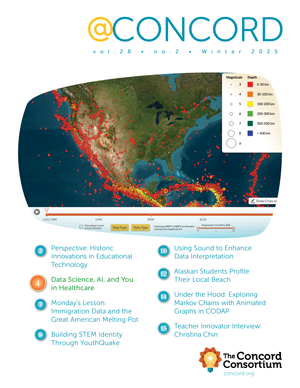News at Concord Consortium
The Pelehonuamea Project
We are expanding an existing Research-Practice Partnership (RPP) to include Indigenous Hawaiian students in order to broaden their sense of agency and investment in learning outcomes. The RPP will include middle school students in the co-design of a curriculum module focused on volcanic risks and hazards. To contextualize and situate learning about volcanic eruption from the Mauna Loa volcano, students will conduct ethnographic studies to capture Hawaiian historical and lived knowledge about volcanic eruptions. They will connect these narratives to the results of visual block- based coding to model lava eruptions and their impacts. Research focuses on 1) how experiencing a culturally and geographically relevant integrated geoscience and computer science curriculum module affects students’ attitudes towards computer science and computational thinking, and 2) to what extent students build computer science and geoscience knowledge to better prepare for diverse job opportunities.
Data Science Interventions Connected to University Athletics
We are partnering with the University of Maryland, College Park to conduct groundbreaking research on how Black male athletes engage with data science and the systemic barriers and biases they face in STEM education. The project will co-design, implement, and assess the impact of a potentially transformative higher education intervention called DataGOAT (Greatest Of All Time) to enable Black male football and basketball athletes to study their own personal sports data and develop STEM identities through critical data literacy. By connecting sports performance and health to data analysis and visualization, we aim to facilitate career pathways from sports to STEM.
Open Data Exploration Tools for K-12 Education
A new initiative is taking the first step towards developing an open-source ecosystem designed to enhance data science education in K-12 schools. We aim to engage and expand the CODAP community, including code contributors, plugin developers, educators, curriculum developers, translators, researchers, and others; identify a distributed development infrastructure for supporting users; research organizational, governance, and coordination models; and explore avenues for ensuring a sustainable ecosystem for CODAP, including commercial opportunities such as professional development services, foundation support, or partnerships with educational technology or industry supporters.
Designing Interactive Visualizations of Neural Pathways
Artificial intelligence (AI) is transforming numerous industries and catalyzing scientific discoveries and engineering innovations. To enter an AI-ready workforce, young people must be introduced to core AI concepts and practices. Our exploratory project will develop and test an interactive, dynamic digital learning tool for middle school students to learn how to interpret neural networks and collaborate with the algorithm to improve AI systems. The team includes learning experience designers and technology developers from the Concord Consortium, computer scientists from Carnegie Mellon University, educational researchers from North Carolina State University, curriculum specialists and teacher educators from Mississippi State University Center for Cyber Education, and usability and feasibility evaluators from WestEd.
Data By Voice
Data science has become essential in modern society, with growing career opportunities and widespread adoption in educational curricula. However, blind and low-vision (BLV) students often lack the tools necessary for meaningful engagement with data. In collaboration with Perkins Access Consulting at the Perkins School for the Blind, we aim to enable BLV students to interact with data through voice commands, sonification, and AI-generated audible descriptions. Leveraging a cutting-edge large language model from generative AI technologies, we are developing and researching an AI-powered agent embedded in CODAP, which provides the interface between the user, the generative AI model, and CODAP. The plugin interprets BLV users’ voice commands to perform data transformations, generates data representations, facilitates non-sequential navigation and exploration of data representations, and provides verbal and sonified descriptions of data representations.
This material is based upon work supported by the National Science Foundation under several grants (DRL-2434388, DUE-2411706, TI-2346126, DRL-2405615, and DRL-2418281). Any opinions, findings, and conclusions or recommendations expressed in this material are those of the author(s) and do not necessarily reflect the views of the National Science Foundation.
